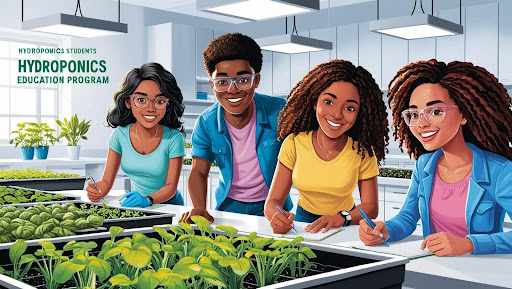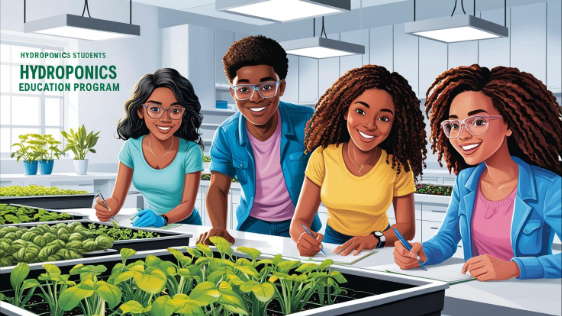
As technology and sustainable farming methods evolve, hydroponics education is becoming valuable in teaching kids about science, agriculture, and environmental responsibility. Hydroponics—the method of growing plants without soil—offers an engaging, hands-on learning experience that sparks curiosity and fosters creativity. But beyond the excitement of watching plants grow in water, hydroponics education programs profoundly benefit young minds. From enhancing STEM learning to encouraging sustainability, let's explore why hydroponics is a game-changer in children's education.
Hands-On Learning That Boosts STEM Skills
Traditional classrooms often rely on textbooks and lectures to teach complex subjects, but hydroponics transforms learning into an interactive experience. Incorporating hydroponic gardening into school curricula, children develop a deeper understanding of STEM education (Science, Technology, Engineering, and Math). Through real-world applications, students can witness plant growth cycles, experiment with different nutrient levels, and analyze the impact of light and water on plant health. This hands-on approach strengthens their problem-solving and critical thinking skills, essential components of a well-rounded STEM foundation.
Encouraging Environmental Awareness and Sustainability
In today’s world, sustainability is more important than ever. Teaching kids about hydroponics helps them understand water conservation, resource efficiency, and the importance of reducing food waste. Unlike traditional farming, hydroponics uses up to 90% less water and eliminates the need for harmful pesticides. By engaging in hydroponics, children learn how sustainable food production can combat environmental issues like deforestation and soil degradation. This early exposure to eco-friendly practices encourages responsible habits that can last a lifetime.
Enhancing Problem-Solving and Critical Thinking Skills
Hydroponic gardening isn't just about growing plants—it’s about solving challenges. Kids must monitor pH levels, adjust nutrient solutions, and troubleshoot issues such as algae growth or root rot. This dynamic process fosters adaptability and innovative thinking, skills that are essential in modern education. Whether they’re adjusting lighting conditions or redesigning a system for better efficiency, students learn to approach problems methodically and think outside the box.
Supporting Healthy Eating Habits and Food Literacy
Getting children involved in growing their own food through hydroponics increases their awareness of nutrition and healthy eating. Studies show that kids who actively participate in gardening are more likely to try and enjoy fresh fruits and vegetables. Since hydroponic systems allow for year-round gardening, children can witness the farm-to-table process firsthand, strengthening their understanding of where food comes from and how it impacts their health. This kind of food literacy is crucial in a world where processed and fast food consumption is on the rise.
Promoting Teamwork and Social Skills
Many schools and community centers implement hydroponic gardens as group projects, fostering teamwork and collaboration. Students must work together to maintain the system, share responsibilities, and discuss solutions. This collaborative learning environment helps them develop communication skills, patience, and leadership qualities. Whether in a classroom or an extracurricular club, hydroponics provides an excellent opportunity for kids to build meaningful connections with peers while working toward a common goal.
Bridging the Gap Between STEM and Robotics
One of the most exciting aspects of hydroponics is its integration with STEM and robotics. Many schools are now combining hydroponic systems with automation, allowing students to use coding, sensors, and robotics to optimize plant growth. Automated hydroponic setups can monitor temperature, adjust water flow, and even use AI to predict plant health. This crossover between agriculture and technology introduces children to modern innovations, preparing them for future careers in science, engineering, and sustainable farming.
Professional Development for Educators
Teachers and educators can also benefit from hydroponics-based learning. Many institutions offer professional development programs focused on integrating hydroponics into school curricula. These workshops help teachers understand the science behind hydroponic systems and provide strategies for making lessons more engaging. Schools can create impactful programs that inspire the next generation of scientists, engineers, and environmentalists by equipping educators with the right knowledge.
Conclusion
Hydroponics education is more than just a trendy gardening technique—it’s a powerful tool for shaping young minds. The benefits are vast and long-lasting, from enhancing STEM learning and sustainability awareness to promoting teamwork and problem-solving skills. As hydroponics continues to evolve, integrating it into classrooms and community programs can cultivate a future where children are more knowledgeable, environmentally conscious, and prepared for the challenges of tomorrow.









Write a comment ...